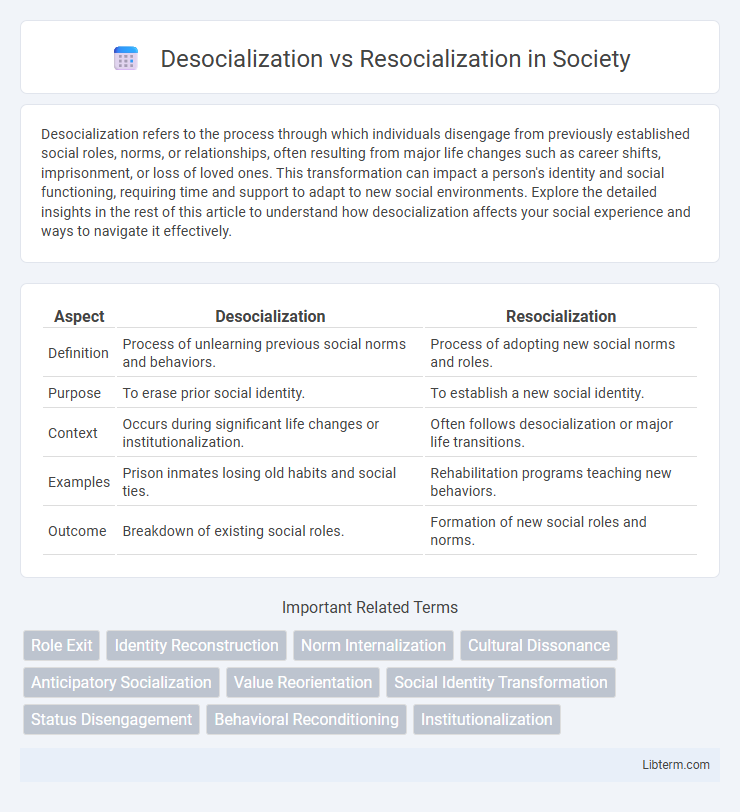Desocialization refers to the process through which individuals disengage from previously established social roles, norms, or relationships, often resulting from major life changes such as career shifts, imprisonment, or loss of loved ones. This transformation can impact a person's identity and social functioning, requiring time and support to adapt to new social environments. Explore the detailed insights in the rest of this article to understand how desocialization affects your social experience and ways to navigate it effectively.
Table of Comparison
| Aspect | Desocialization | Resocialization |
|---|---|---|
| Definition | Process of unlearning previous social norms and behaviors. | Process of adopting new social norms and roles. |
| Purpose | To erase prior social identity. | To establish a new social identity. |
| Context | Occurs during significant life changes or institutionalization. | Often follows desocialization or major life transitions. |
| Examples | Prison inmates losing old habits and social ties. | Rehabilitation programs teaching new behaviors. |
| Outcome | Breakdown of existing social roles. | Formation of new social roles and norms. |
Understanding Desocialization and Resocialization
Desocialization involves the process of unlearning previously acquired behaviors, norms, and values, often occurring in total institutions or situations of major life changes. Resocialization refers to the deliberate effort to adopt new behaviors and attitudes to fit into a different social environment or role, frequently facilitated through structured programs or social encounters. Understanding these processes is crucial in sociology and psychology as they explain how individuals adapt to new social contexts and identity transformations.
Key Differences Between Desocialization and Resocialization
Desocialization involves the process of unlearning previous social behaviors, norms, and values typically seen during significant life changes such as incarceration or rehabilitation. Resocialization is the subsequent process of adopting new norms, values, and behaviors needed to integrate into a different social environment or role, such as entering a new profession or culture. Key differences include desocialization focusing on discarding old behaviors, while resocialization emphasizes acquiring new ones for successful social adaptation.
The Psychological Impact of Desocialization
Desocialization disrupts established social roles and identity, often causing confusion, anxiety, and emotional distress as individuals detach from previous norms and behaviors. This psychological impact can lead to feelings of isolation, loss of self-esteem, and a weakened sense of belonging. Understanding these effects is crucial for facilitating effective resocialization and helping individuals rebuild a coherent social identity.
Stages of the Desocialization Process
Desocialization involves the unlearning of previously acquired behaviors, norms, and values, often observed in transitional life events or institutional settings. The stages of the desocialization process include the breakdown of existing identity, loss of previous social roles, and erosion of personal beliefs, which collectively dismantle an individual's prior social conditioning. This process is fundamental before effective resocialization can introduce new social roles, norms, and behaviors tailored to different social environments or expectations.
Factors Influencing Resocialization
Factors influencing resocialization include the individual's prior social experiences, the intensity of the resocialization process, and the support systems available during transition. The environment where resocialization occurs, such as total institutions like prisons or military boot camps, plays a crucial role in shaping behavior and identity. Psychological resilience and willingness to adapt also significantly impact the effectiveness of resocialization efforts.
Real-World Examples of Desocialization and Resocialization
Desocialization occurs when individuals unlearn previous behaviors and norms, exemplified by prisoners who shed societal habits during incarceration. Resocialization follows as they adapt to new roles and expectations upon release, often through rehabilitation programs or support groups that instill pro-social behaviors. Military boot camps also illustrate these concepts, where recruits undergo desocialization by discarding civilian roles and resocialization as disciplined soldiers within the armed forces.
The Role of Institutions in Social Adjustment
Institutions such as prisons, military, and rehabilitation centers are pivotal in the processes of desocialization and resocialization by systematically dismantling old behaviors and norms before instilling new ones aligned with institutional goals. Desocialization involves stripping away former social identities, while resocialization rebuilds identity through structured rituals and rules that facilitate social adjustment. These institutions ensure compliance and integration by enforcing social control mechanisms that reshape individual attitudes and behaviors to fit a new social context.
Challenges Faced During Resocialization
Resocialization involves adapting to new norms and values, often requiring individuals to unlearn established behaviors, which poses significant psychological and emotional challenges. The process can lead to identity confusion and resistance as individuals struggle to reconcile previous social roles with new expectations. Support systems and structured interventions enhance successful adjustment by mitigating stress and promoting gradual internalization of new social norms.
Strategies for Successful Resocialization
Effective strategies for successful resocialization include consistent support systems, structured learning environments, and tailored behavioral interventions that address individual needs. Emphasizing positive reinforcement, skill development, and gradual exposure to new social norms helps individuals overcome prior desocialization effects. Collaboration between social workers, counselors, and community resources enhances the sustainability of resocialization outcomes.
The Importance of Social Support Systems
Desocialization involves the process of unlearning previous social roles and behaviors, while resocialization introduces new norms and values within individuals. The importance of social support systems lies in their ability to facilitate smoother transitions during these processes by providing emotional, informational, and instrumental assistance. Strong social networks enhance adaptation, reduce stress, and promote successful reintegration into new social environments.
Desocialization Infographic

 libterm.com
libterm.com